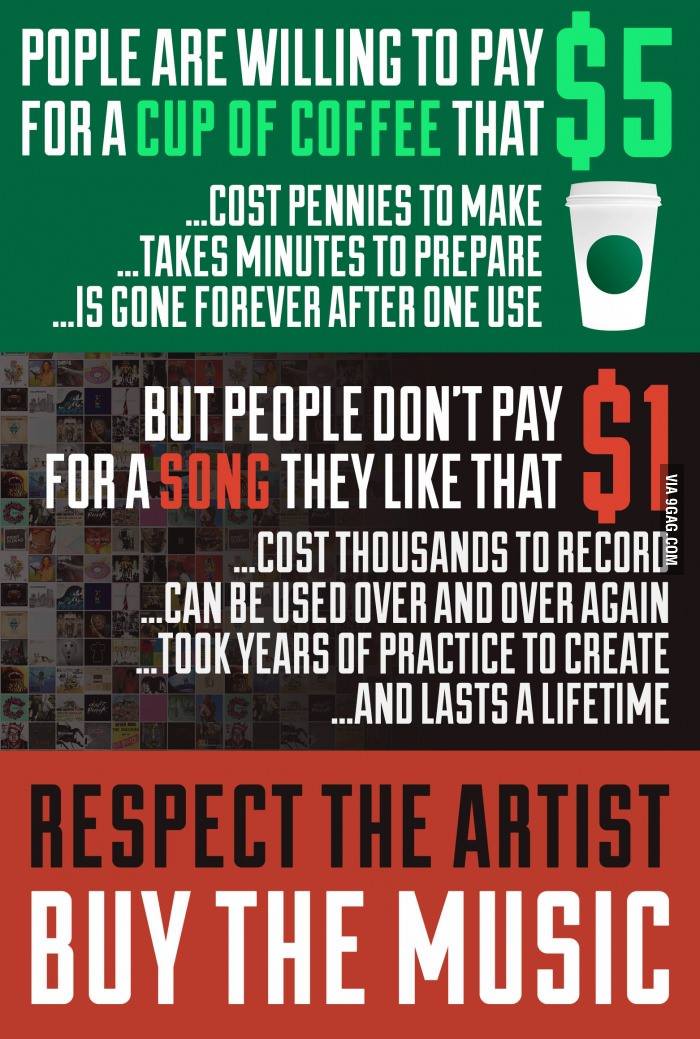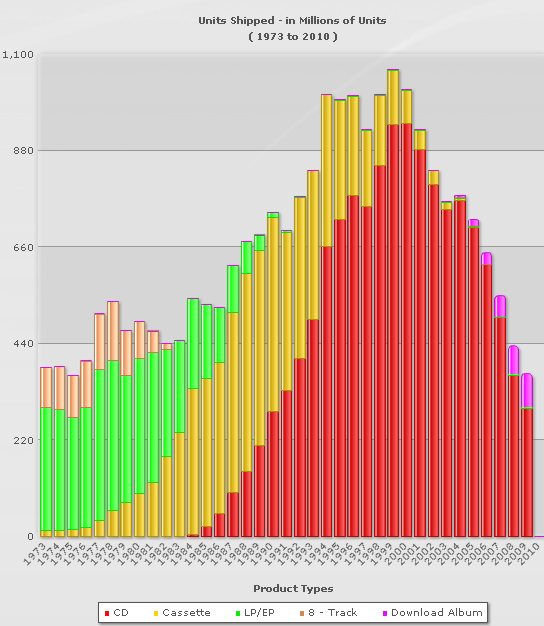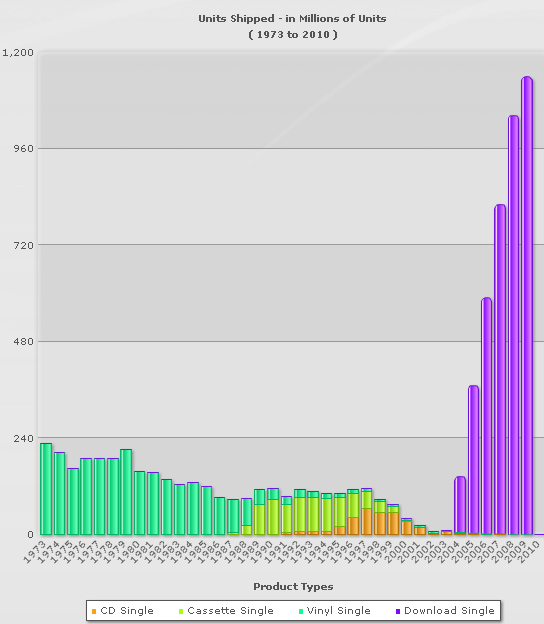Respect the Artist… Don’t Buy the Song
 I saw this graphic on Facebook today, and it really cheesed me off. While the message has some truth to it, it is filled with subtle yet powerful distortions.
I saw this graphic on Facebook today, and it really cheesed me off. While the message has some truth to it, it is filled with subtle yet powerful distortions.
To say that a cup of coffee costs “pennies” to make is misleading; “pennies” sounds like 5~9 cents, while the actual cost in materials is over a dollar, and the price goes up if you account for costs such as labor, rents, etc.
That a cup of coffee takes “minutes to prepare” is also wrong, because the comparison is with the beginning-to-end song production; to account for coffee production in the same way, from planting to processing to shipping to preparing and to serving, making a cup of coffee can involve hundreds of people over a year or more of time to create. Hell, the graphic even cites musicians’ “practice”! How about farmers’ training? No, if you count coffee as taking “minutes” to prepare, then a song takes only “minutes to sing.”
That coffee is “gone forever after one use” is simply the nature of the product—should we value food and drink less because we cannot eat and drink them endlessly?
Not to mention that a cup of coffee can be made to last for a good half hour, resting in a comfy chair at the coffee shop while reading a nice book. A song lasts maybe three minutes, so a cup of coffee can be worth maybe 10 listens. You may still listen to a song dozens of times, but by the time metric, the comparison is far less severe than it is made out to be.
As for the songs, well, those claims are also exaggerated. Yes, it costs thousands of dollars to record—but after they record it, they can cheaply create endless millions of copies. Divided between copies, the cost comes to… pennies!! Much less than a cup of coffee, to be certain! It may cost $100,000 to record a song, but a best-selling song can sell 10 million copies. That’s about one penny per copy.
It can be used over and over again… but not exactly. First, media types (records, tapes, CDs, digital) change often, and every time they do, the music industry demands you pay full price for the new version. Some people have been made to pay for the same Beatles song half a dozen times. Many of these versions have been discarded when the new ones present themselves, so not a “lifetime” thing after all.
Second, it used to be that you owned the media; you could buy or sell used, you could borrow or lend. You could inherit music from a parent, even. Now, you only own the “license”—the temporary, limited right to listen to the music in restricted ways. And when a music service dies, or if you stop paying, you usually lose access to the music you paid for. You can pay $1 for a song, but you can’t own it for $1.
For you to truly buy and own a song for a long time (maybe a lifetime), you have to buy the CD… which is much more expensive than the coffee.
The final statement, however, is the worst of all, and makes me really angry. The biggest text on the graphic: RESPECT THE ARTIST: BUY THE MUSIC.
Oh, really? Well, aside from the fact that you don’t “buy” it anymore (you pay for a license), the whole “respect the artist” thing is a heaping, stinking pile of bull.
Music labels have for decades abused the artists, and pay them very little or even nothing; most artists make their money from tours and performances, even endorsements, but not from music sales. The artists’ income from music sales is a tiny percentage (divided between the band and their managers & agents), but that’s before the studios first charge the band for almost every possible cost they can force them to pay. For example, although everyone profits from the use of the studio, the artists are forced to pay for that by themselves. In the end, they get little to nothing—literally nothing, very often. Lyle Lovett, for example, sold 4.6 million albums, and got a net of $0. Nothing. Not a single penny.
Indeed, artists are forced to sign long-term contracts and give up their rights, working long and hard for the tiny chance at success, while the music companies rake in all the profits. So, every time I hear the industry shout, “Respect the Artist!” my response is simple: You first.
Here’s the real irony: if you pirate every MP3 you listen to, but go to the concerts to listen to your favorite bands, then you are respecting the artists. That gives them the most profit. I’m not saying you should pirate the music, I am only pointing out that it rarely, if ever, hurts the artist. It hurts the insanely rich recording studios who abuse the artists.
Most artists don’t care if you pirate the music; in fact, the more you pirate their music, the more likely you are to want to see them in concert, which gives them much more profit than if you bought the rights to listen to the song! But the artists can’t usually say that, because they still are bound to the music companies. Some do, however; Lady Gaga, Neil Young, Shakira, Norah Jones, and many others have actually said they’re OK with piracy… and no wonder. It helps them more than it hurts them. Neil Young calls piracy “the new radio.”
Whatever you think of piracy, whatever its legal status, it has no damaging effect on them. When studios condescendingly exhort us to “respect the artist,” it’s like billionaires saying that the estate tax “hurts farmers.” Which is bullshit—and, ironically, actual bullshit does help the farmers. The bullshit in the graphic above, though, helps the artists not even a little. It may even hurt them.


